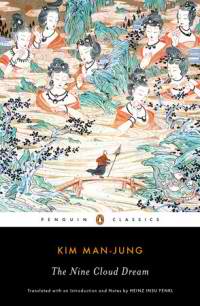
Translation by Heinz Insu Fenkl published by Penguin Classics on February 12, 2019
The Nine Cloud Dream is a 17th century Korean novel set in China during the Tang Dynasty. The translation is new and lively. The story, about a young man who is seemingly reincarnated into a long and prosperous life, draws upon Buddhist faith to teach the protagonist a valuable lesson. The young man lives a full life as the story unfolds (or so it seems), and only at the end does he achieve a spiritual awakening. Along the way he encounters ghosts, fairies, fortune tellers, and all varieties of mystics. Offhand references to specific figures from Chinese history or stories from Chinese folklore are footnoted, so scholarly readers can consult the footnotes to learn more about the background that informs the story.
Modern readers might also note that the women in the story exist solely to serve men and are expected to be faithful, while men are free (and successful men are apparently encouraged) to sleep with as many women as they can. “Though I am lowborn and uneducated, I have always longed to serve a great man” one woman confesses after concealing her identity so she could “serve” the protagonist in bed. Becoming a concubine is a path of upward mobility, the Chinese version of “Here’s your one chance, Fancy, don’t let me down.” But if things do not work out as planned, women pray to Buddha that in the next life they will be reborn as a man.
Master Liu-Kuan sends a young monk named Hisng-chen to pay the Master’s respects to the Dragon King in his Underwater Palace. Hisng-chen has a nice time, drinking forbidden wine to avoid offending his host. He encounters eight fairies on his way home. Back at the monastery, his meditation is interrupted by thoughts of the property and women he has sacrificed to seek enlightenment. Later, the Master banishes Hisng-chen to the Underworld for his sins of drinking alcohol, flirting with fairies, having carnal thoughts, and yearning for a life of pleasure.
The King of the Underworld knows that each man follows his own path to perfection and that each is reborn to “work out his karma.” That “cycle of samsara” is inevitable; Hisng-chen cannot escape it. He is reincarnated as a baby named Shao-yu and must start the cycle again. In the months that follow his rebirth, he forgets his prior life.
The bulk of the story follows Shao-yu as he moves from a simple but impoverished life to a position of great importance in the service of the Emperor. Shao-Yu dresses as a woman to get a glimpse of a girl he desires and must face the wrath of a woman deceived as she plots a trick of her own. The girl, of course, is the Emperor’s daughter. Shao-yu has a much-admired flair for poetry, as do many of the women he desires. His blend of skill and humility brings him to the attention of the Emperor and the Emperor’s mother. He becomes a diplomat in the service of the Emperor and visits the rebellious governor of a distant province. Eventually he fights a war with Tibet, although he falls under the spell of a Tibetan woman (or spirit) who beds him. Then he beds an old love, then beds two women at the same time, before deciding to take them home and make a permanent arrangement with the women and his fiancé. But the Emperor wants Shao-Yu to wed his beautiful daughter, a request that is complicated by his engagement. Before that conflict can be resolved, he rides off to fight a battle and sleeps with a Dragon Princess who also decides to marry him. As I was reading these chapters, my only thought was, “Man, I want to be this guy.”
By the time the story ends, Shao has two wives and a gaggle of concubines. As an aging man, he decides the time has come to retire to a rural home with a mountain view. It is only then that he realizes that all he has achieved has been meaningless because it has not brought enlightenment. The reader at that point learns the true nature of his life, although the title kind of gives it away.
The story will certainly appeal to readers with an interest in Buddhism or Chinese history. But there’s something here for fans of fantasy, adventure, and coming-of-age stories. The protagonist’s sex life alone would have been enough to hold my interest. It is easy to understand why The Nine Cloud Dream has endured as a classic of Korean literature.
RECOMMENDED